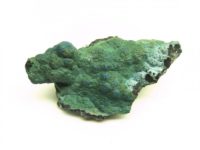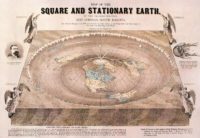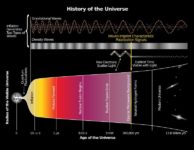By Creation Moments The descendants of Ham, who were cursed, were the Canaanites. Yet when Rahab, a Canaanite, came to faith in the true God, she not only was welcomed to marry a believer, but God included her in the line leading to Christ. The idea of different races, as distinct from different religions, was not much of an issue until 1859 when Charles Darwin published his famous book, On the Origin of Species. read more …read more Source: Creation Moments
By Creation Moments When I was a high school science teacher, I taught both Physics and Chemistry. However, Chemistry was my main subject. Because of my background in education, I really enjoy taking groups of families and young people on the excursions to Mount St Helens, which I lead two or three times a week during the Summer. read more …read more Source: Creation Moments
By Creation Moments Science has an elevated position in Western society. There are those who would try to put Christians down, by saying “You have faith, but I have science”. Science, in the abstract, is therefore assumed to be the ultimate truth, and the universal standard, against which everything must be tested. read more …read more Source: Creation Moments
By Creation Moments Since starting these broadcasts, I have received a number of surprising emails, from people who claim to believe that the Earth is flat, instead of spherical. Is the idea of a spherical earth a lie fed to us as if it were true, along with evolution and deep time? No. read more …read more Source: Creation Moments
By Creation Moments Frequent excursions into the Mount St Helens National Volcanic Monument bring me regularly into areas populated by beavers. Many of the ponds around the Hummocks show signs of beaver activity. One notable dam, which I often see on the trail, is over four feet high, and is easily over 50 feet long. read more …read more Source: Creation Moments
By kpennock On this episode of ID the Future, Brian Miller, who holds a Ph.D. in physics from Duke University, examines Dr. Jeremy England’s physics-based theory of the origin of life. England’s theory, based on his studies of “non-equilibrium systems,” suggests that a system driven strongly enough could create order and therefore be a potential explanation for the origin of life. Miller summarizes the theory and discusses what he sees as its fatal weaknesses. Your browser does not support playing Audio, please upgrade your browser or find our podcast on podOmatic Download Episode …read more Source: id the future
By Creation Moments There are those that claim that Evolution is a scientific theory. Scientific theories can be subject to the scientific method. If the same test or experiment is carried out under the same conditions, on different days or locations, the results should still be the same. read more …read more Source: Creation Moments
By Sarah Chaffee On this episode of ID the Future, Rob Crowther discusses controversy in the science classroom with Senior Fellow and historian of science Dr. Michael Keas. Listen in as Keas discusses various areas of controversy, and advises teachers that “science is best taught as science is best practiced.” Your browser does not support playing Audio, please upgrade your browser or find our podcast on podOmatic Download Episode …read more Source: id the future
By Sarah Chaffee On this episode of ID the Future, enjoy an excerpt from Discovery Institute’s documentary Revolutionary. It’s been more than a decade since the judge handed down his decision in the Dover intelligent design trial. At the time the mainstream media told the world one story about the trial. Now Revolutionary tells the rest of the story – recounting Behe’s defense of the bacterial flagellum as an example of irreducible complexity, and criticisms of Judge Jones’ decision. Watch Revolutionary now, available for free online at www.revolutionarybehe.com. Your browser does not support playing Audio, please upgrade your browser or [More]
By Sarah Chaffee On this episode of ID the Future, hear a clip from the ID film Revolutionary, and join Ray Bohlin and Michael Behe as they discuss how German paleo-entomologist Günter Bechly became convinced of intelligent design, and the lessons to glean from Bechly’s dramatic story. In the time since this documentary was filmed and this podcast recorded, Bechly was forced to resign from his position as curator at the prestigious State Museum of Natural History in Stuttgart, Germany. And now this month, his English language Wikipedia page has disappeared. Bechly, meanwhile, is standing by his convictions. Revolutionary the [More]
By Sarah Chaffee On this episode of ID the Future, listen to a lecture given by David Snoke at a conference sponsored by the Christian Scientific Society. Dr. Snoke, professor of physics and astronomy at the University of Pittsburg, answers the question is information a physical entity?, and discusses the nature of information processing systems. Your browser does not support playing Audio, please upgrade your browser or find our podcast on podOmatic Download Episode …read more Source: id the future
By Creation Moments Numerous television programs have been made about the Komodo dragon and the creatures are even going on display at some zoos. Reaching up to 400 pounds, they can even outrun a man. And they eat anything that they find dead or alive. Even a simple bite from a dragon will prove fatal within 72 hours unless you get immediate treatment. read more …read more Source: Creation Moments
By Creation Moments In 2 Peter 2:5, the apostle remarks, almost parenthetically, that “[God] did not spare the ancient world, but preserved Noah, a herald of righteousness, with seven others, when he brought a flood upon the world of the ungodly.” Noah was a herald of righteousness—someone proclaiming the Good News! read more …read more Source: Creation Moments
By kpennock On this episode of ID the Future, Zombie Science author Jonathan Wells talks about his multifaceted, impressive and, at times, quirky educational history. Dr. Wells started as an undergrad geology major at Princeton and later moved to Berkeley to finish his undergraduate work. He was arrested as a conscientious objector and saw the ugly side of the anti-war movement. Disgusted, he moved to the remote mountains and there discovered evidence of intelligent design. After snagging a Ph.D. in theology from Yale, he returned Berkeley for his second Ph.D., this one in embryology. It was in studying embryos that [More]
By Creation Moments Wood will get waterlogged, if it is left in water for too long. And yet wood has often been used throughout history to build boats and ships. For example, the city of Pensacola, Florida, was, in many ways, the birthplace of the US Navy, because of the deep harbor, and the abundance of live oaks, from which to build ships. To prevent water-logging, the wood must be treated, to make it waterproof. read more …read more Source: Creation Moments
By Creation Moments Outer space has a temperature. It has become common to think of space as a vacuum, that has nothing in it, which means it would be at absolute zero temperature. In fact, space is nearly a vacuum, but not quite. And the particles in that near vacuum are in motion, so they have a temperature of 2.73K—the equivalent of 2.73 Celsius degrees above Absolute Zero. read more …read more Source: Creation Moments
By Creation Moments Many secular cosmologists believe that the universe came into existence in a singularity, as a result of a quantum event about 14.7 billion years ago. However, this so-called Big Bang theory is not without its problems. Principle among these is the Horizon Problem, which refers to the fact that Big Bangers cannot account for the Cosmic Microwave Background being the same temperature in all directions. read more …read more Source: Creation Moments
By Creation Moments C.S. Lewis suggested that those who deny the supernatural can still believe in a god of sorts. He said: read more …read more Source: Creation Moments
By Sarah Chaffee On this episode of ID the Future, listen to Michael Denton read an excerpt of his new volume, The Wonder of Water. In the book, Denton delves into this grand untold story and explores how water is specially equipped to allow life to flourish on our blue planet. This ever-present substance is amazingly fit in a myriad of ways to sustain life on earth, especially human life. Its unique properties allow it to fill many roles throughout the biological world, from forming the matrix of our cells, to regulating the temperature of our planet. Your browser does [More]
What you believe about Genesis impacts both faith and science. In this series, ICR physicist Dr. Jake Hebert unravels the mysteries of the Ice Age, hermeneutics, geological dating methods, and more. How should Christians respond to old-earth arguments? Can we view scientific research through the lens of Scripture? And how should we to respond to those who compromise the first book of the Bible? More… …read more Source: icr.org
By Creation Moments Americans lead the industrialized world in belief in creationism and a literal Bible. A recent study by a University of Cincinnati researcher, compares American’s belief in a recent creation and the truth of the Bible with beliefs in other countries. The study found that 45 percent of Americans believe that God created the world less than 10,000 years ago. Another 40 percent try to mix God and evolution. read more …read more Source: Creation Moments
By kpennock On this episode of ID the Future, Ray Bohlin interviews physician Howard Glicksman about hemoglobin and the body’s need to have enough of it to transport sufficient oxygen to the tissues. Finely-tuned and exquisitely engineered, this system gave our ancestors enough oxygen to not only stay alive but thrive in the face of hostile challenges. Dr. Glicksman is author of an extended series of posts at Evolution News & Science Today, “The Designed Body.” Your browser does not support playing Audio, please upgrade your browser or find our podcast on podOmatic Download Episode …read more Source: id the [More]
By Creation Moments Would you like to be able to walk on water the way Jesus did? The closest human beings have come to walking on water is water skiing, which some even do without skis. But they still need a powerful and noisy power boat to do it. But there is an animal that can walk on water without help of any kind. read more …read more Source: Creation Moments
By kpennock In this episode of ID the Future, geneticist and biochemist Michael Denton reads the beautiful introduction to his new book, The Wonder of Water. He begins at Yosemite’s Bridalveil Fall and explores how water is curiously fine-tuned for life. Indeed, thanks to a unique cluster of properties, water is able to fulfill many roles essential to our living planet. It’s thanks to some of those properties that rivers and streams can leech and carry minerals from rock to various places they’re needed in the biosphere. Water’s unusual properties also make it an ideal medium for our circulatory system. [More]
By Creation Moments Out of more than 30,000 species of spiders, there are three species that make their living through thievery. Several years ago that number was raised from two with the discovery of a tiny, thieving species on the island of Taiwan. The other two species live in South America and are known to steal only silk from the webs of other spiders. read more …read more Source: Creation Moments
An actor in Hollywood raises the important question of when people should and shouldn’t be skeptical of claims made in the name of science, inspiring a response from political scientist John West, author of Darwin Day in America. Listen: https://discovery.org/multimedia/audio/2017/10/when-we-should-and-shouldnt-be-skeptical-of-science/
By Creation Moments A few years ago we aired a “Creation Moments” program about how plants seem to have pain and alarm responses similar to humans and animals. Of course, we don’t know if plants have feelings as we know them. But when a plant is injured, it produces a chemical called jasmonic acid. This acid produces a vapor, similar to the jasmine in commercial perfumes, that is sensed by surrounding plants. read more …read more Source: Creation Moments
































![Science and Theology [Podcast] Science and Theology [Podcast]](http://proofthebibleistrue.com/wp-content/uploads/2017/10/82780-thumb-200x124.jpg)



